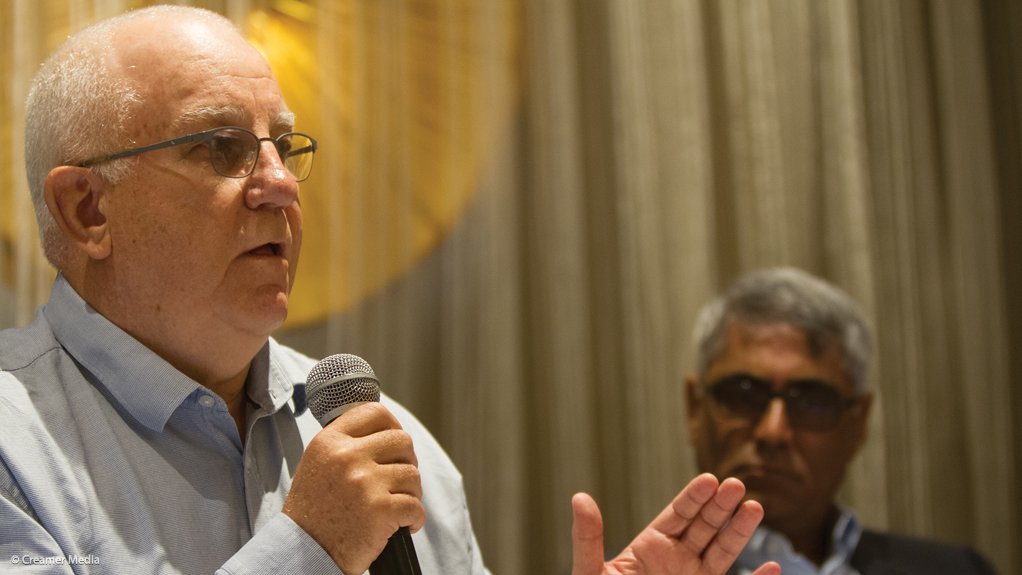Concerns raised over lack of policy framework for competition law changes


Wits Faculty of Commerce, Law and Management Dean Imraan Valodia, CCRED director Simon Roberts, Genesis Analytics’ James Hodge, DTI’s Garth Strachan, Advocate Michelle le Roux and the Competition Commission’s Liberty Mncube on proposed changes to the South Africa’s Competition Act and the lack of an overarching policy framework. Camera Work: Nicholas Boyd. Editing: Christo Greyling. Recorded: 19.1.2018
Garth Strachan speaks while Imraan Valodia looks on at a CCRED panel discussion on competition legislation
Photo by Duane Daws
Concern has been expressed about the absence of a comprehensive competition policy framework to help guide proposed amendments to competition legislation and facilitate greater alignment with other government policies and programmes, such as the Industrial Policy Action Plan.
In December, Economic Development Minister Ebrahim Patel released the Competition Amendment Bill for public comment and indicated that the proposed legislation should be placed before lawmakers during the first half of 2018.
The proposed legislative changes, which were drafted with the assistance of an expert panel, will remain open for public comment until the end of January.
The draft amendments outline a strengthening of the Competition Act to tackle high levels of economic concentration, as well as to address South Africa’s racially skewed corporate ownership profile.
Several changes are proposed for the way in which the competition authorities assess and control mergers and acquisitions, as well as abuse of dominance cases.
However, the main change relates to the functioning and powers of the market inquiry instrument, which the Competition Commission is empowered to deploy to interrogate underlying structural causes of concentration in a sector.
The draft amendments state that the commission’s market inquiry remedies will be binding and also enable divestiture as a possible remedy. However, only the Competition Tribunal, following a commission recommendation, can impose divestiture and the affected company has a right to appeal to the Competition Appeal Court.
University of the Witwatersrand Dean of the Faculty of Commerce, Law and Management Professor Imraan Valodia, who served on Patel’s expert panel, said that, while the panel stood by its recommendations to the Minister, he felt, personally, that it would have been preferable for the amendments to have flown from a broader review of South Africa’s competition policy.
Speaking during a panel discussion organised by the Centre for Competition, Regulation and Economic Development (CCRED), Valodia argued that competition law should be one component of a far larger view on how South Africa uses competition policy to deal with economic problems, or to steer the economy in a certain direction.
“It’s important, because competition law has to operate within a certain framework and I think there is a justifiable concern that we might be trying to do everything within the competition-law space,” Valodia said.
Likewise, CCRED director Professor Simon Roberts argued that there was a risk that, because other parts of government and other policies have failed in de-concentrating the economy, competition law was being viewed as the solution.
Roberts said this risk was arguably exacerbated by the absence of an overarching competition policy, dealing not only with the role that the competition authorities play in promoting competition and dealing with high levels of concentration, but also other policies and institutions.
“It’s striking that there be very little mention of competition in the National Development Plan. And given that we are really talking about how a market economy works, I think it would be good, in the context of the debate and separate from these specific amendments, that this issue gets pushed repeatedly.”
COMPETITION ‘FUNDAMENTALISM’
Department of Trade and Industry (DTI) deputy director-general for industrial policy Garth Strachan was even more strident, arguing that there was a danger that the legislation could constrain the space for other policies aimed at supporting industrialisation.
“There is a healthy tension between what is collusion and what is collaboration and if we get that tension wrong, we could be guilty of falling prey to . . . competition fundamentalism.”
Strachan said there were already instances where the country’s competition legislation was being used as the main argument against certain industrial actions designed to bolster, or protect, domestic manufacturing.
He cited the example of the National Treasury’s refusal to allow the DTI to designate “yellow metal” equipment for local procurement by government and State-owned companies on competition concerns, while the Competition Commission has warned the South African Bureau of Standards that the role of industry associations in standard setting is considered collusive.
“In the yellow metal sector, there is one company that is basically the key economic activity in the town of Richards Bay. The National Treasury prevented us from designating for local procurement, citing competition issues,” Strachan outlined, referring to capital equipment group Bell.
“The upshot is that the local municipality purchases imported equipment, even though the local manufacturer, which supports 4 000 jobs in Richards Bay, is globally competitive and exports into the North American and European markets.”
He said that, if the amendments lead to a further tightening of the space in which we can deploy other policy instruments, the DTI will voice strong opposition in upcoming Parliamentary processes.
“We think that we need to be very careful to ensure that the amendments to the Act do not close the space for the deployment of industrial policy instruments and I’m afraid to say we are sailing very close to the wind.”
Advocate Michelle le Roux, who also sat on the expert panel, welcomed the criticism and stressed that the panel was acutely aware of the concerns, including whether the legislation was asking too much of the competition authorities, as well as the potential for the amendments to result in conflicts with other policies and institutions.
“But just because we have these concerns, doesn’t mean we should sit on our hands and not propose amendments that drive forward the goals and objectives of the Act,” Le Roux argued.
Similarly, Competition Commission chief economist Professor Liberty Mncube said that, despite the success of the competition authorities over the past 20 years in clamping down on cartels, dealing with anti-competitive mergers and tacking abusive behaviour, economic concentration in the economy persisted.
“The amendments bring extra tools to the commission to enforce aggressively,” Mncube said.
Article Enquiry
Email Article
Save Article
Feedback
To advertise email advertising@creamermedia.co.za or click here
Comments
Announcements
What's On
Subscribe to improve your user experience...
Option 1 (equivalent of R125 a month):
Receive a weekly copy of Creamer Media's Engineering News & Mining Weekly magazine
(print copy for those in South Africa and e-magazine for those outside of South Africa)
Receive daily email newsletters
Access to full search results
Access archive of magazine back copies
Access to Projects in Progress
Access to ONE Research Report of your choice in PDF format
Option 2 (equivalent of R375 a month):
All benefits from Option 1
PLUS
Access to Creamer Media's Research Channel Africa for ALL Research Reports, in PDF format, on various industrial and mining sectors
including Electricity; Water; Energy Transition; Hydrogen; Roads, Rail and Ports; Coal; Gold; Platinum; Battery Metals; etc.
Already a subscriber?
Forgotten your password?
Receive weekly copy of Creamer Media's Engineering News & Mining Weekly magazine (print copy for those in South Africa and e-magazine for those outside of South Africa)
➕
Recieve daily email newsletters
➕
Access to full search results
➕
Access archive of magazine back copies
➕
Access to Projects in Progress
➕
Access to ONE Research Report of your choice in PDF format
RESEARCH CHANNEL AFRICA
R4500 (equivalent of R375 a month)
SUBSCRIBEAll benefits from Option 1
➕
Access to Creamer Media's Research Channel Africa for ALL Research Reports on various industrial and mining sectors, in PDF format, including on:
Electricity
➕
Water
➕
Energy Transition
➕
Hydrogen
➕
Roads, Rail and Ports
➕
Coal
➕
Gold
➕
Platinum
➕
Battery Metals
➕
etc.
Receive all benefits from Option 1 or Option 2 delivered to numerous people at your company
➕
Multiple User names and Passwords for simultaneous log-ins
➕
Intranet integration access to all in your organisation




















